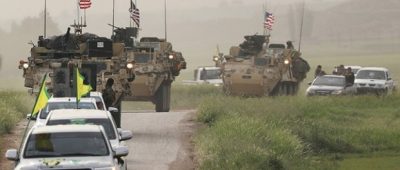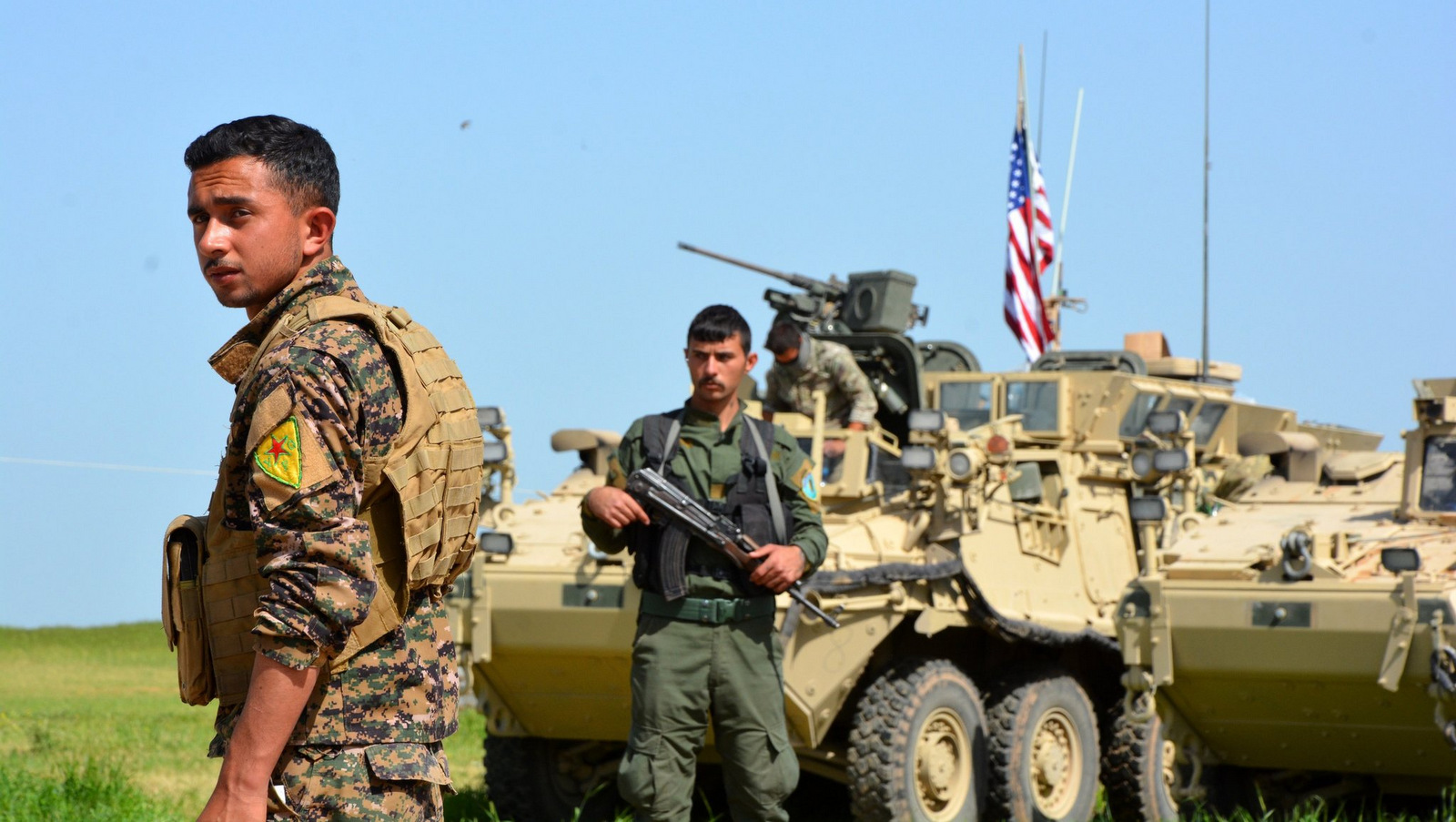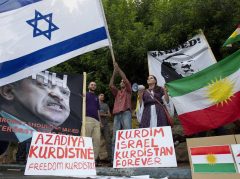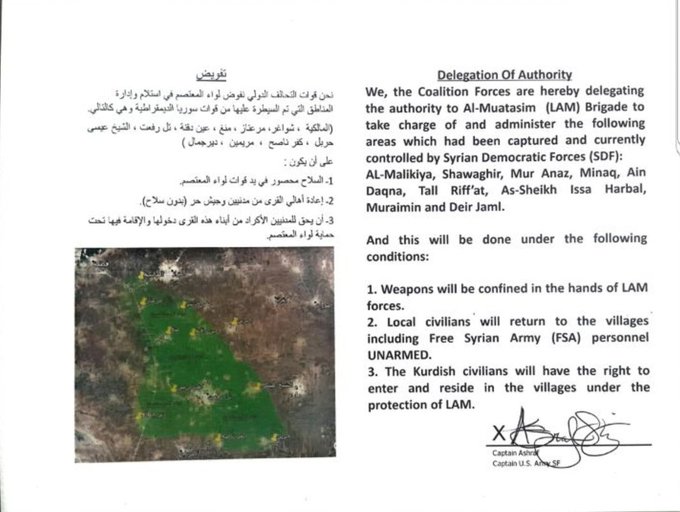In this three part series, MintPress and Global Research contributor Sarah Abed analyzes the role that some Kurdish factions have played throughout history in helping major powers create chaos in the Middle East – from the Kurdish uprising in Iraq in the 1960s to the ongoing conflict in Syria today.
Part I of the Three-Part Series
 SYRIA (Analysis)– Historical accounts of the Kurds have been a subject of mystery and perplexity for years, and have been seldom discussed by major Western media outlets until recently. Since the U.S. invasion of Iraq and the ongoing conflict in Syria, Kurds have been romanticized by mainstream media and U.S. politicians alike to justify a Western interventionist narrative in those countries. Ever since the U.S. invaded Syria, the U.S. and Israel have supported the semi-autonomous Kurdistan, with Israel purchasing $3.84 billion dollars worth of oil from them, a move that could have geopolitical and economic ramifications for both parties.
SYRIA (Analysis)– Historical accounts of the Kurds have been a subject of mystery and perplexity for years, and have been seldom discussed by major Western media outlets until recently. Since the U.S. invasion of Iraq and the ongoing conflict in Syria, Kurds have been romanticized by mainstream media and U.S. politicians alike to justify a Western interventionist narrative in those countries. Ever since the U.S. invaded Syria, the U.S. and Israel have supported the semi-autonomous Kurdistan, with Israel purchasing $3.84 billion dollars worth of oil from them, a move that could have geopolitical and economic ramifications for both parties.
In 2015, the Financial Times reported that Israel had imported as much as 77 percent of its oil supply from Kurdistan in recent months, bringing in some 19 million barrels between the beginning of May and August 11. During that period, more than a third of all northern Iraqi exports, shipped through Turkey’s Ceyhan port, went to Israel, with transactions amounting to almost $1 billion, the report said, citing “shipping data, trading sources, and satellite tanker tracking.”
The sales are a sign of Iraqi Kurdistan’s growing assertiveness and the further fraying of ties between Erbil and Baghdad, which has long harbored fears that the Kurds’ ultimate objective is full independence from Iraq.

In 1966, Iraqi defense minister Abd al-Aziz al-Uqayli blamed the Kurds of Iraq for seeking to establish “a second Israel” in the Middle East. He also claimed that “the West and the East are supporting the rebels to create [khalq] a new Israeli state in the north of the homeland as they had done in 1948 when they created Israel. Interestingly enough, history is repeating itself with their present-day relationship – the existence of which is only acknowledged in passing by either side for fear of retribution.
For much of the conflict in Syria, several Kurdish militias have become some of the U.S.-led coalition’s closest allies within the country, receiving massive amounts of arms and heavy weapon shipments, as well as training from coalition members. Kurdish militias also dominate the Syrian Democratic Forces (SDF), the U.S.-backed group best known for leading the coalition-supported offensive targeting the Daesh (ISIS) stronghold of Raqqa.The weapons that the United States has provided Kurdish and Arab fighters in the anti-Islamic State coalition include heavy machine guns, mortars, anti-tank weapons, armored cars and engineering equipment.
In May, U.S. President Donald Trump approved arming Kurdish militiamen in Syria with heavy weaponry, including mortars and machine guns. Within one month of Trump’s approval, 348 trucks with military assistance had been passed to the group, Anadolu added. According to the news agency’s data, the Pentagon’s list of weapons to be delivered to the group includes 12,000 Kalashnikov rifles, 6,000 machine guns, 3,000 grenade launchers and around 1,000 anti-tank weapons of Russian or U.S. origin.
The United States’ shipments included 130 trucks, with 60 cars passing on June 5, and 20 vehicles on June 12, per Sputnik News.
On June 17, Sputnik News reported that the United States is still supplying the Democratic Union Party (PYD) in Syria with ammunition to fight Daesh, delivering 50 truckloads in one day alone, according to Turkish media reports. Earlier in the day, the trucks reached the city of al-Hasakah in northwest Syria.
Both historical and modern day ties between Israel and the Kurds have brought benefits to both sides. In the past, Israel has obtained intelligence, as well as support, for a few thousand Jews fleeing Ba’athist Iraq. The Kurds have received security and humanitarian aid, as well as links to the outside world, especially the United States. The first official acknowledgment that Jerusalem had provided aid to the Kurds dates back to Sept. 29, 1980, when Prime Minister Menachem Begin disclosed that Israel had supported the Kurds “during their uprising against the Iraqis in 1965 to 1975” and that the United States was aware of this fact. Begin added that Israel had sent instructors and arms, but not military units.

The Kurds are the largest group of nomadic people in the world that have remained stateless since the beginning of time. This fact has allowed Western powers to use the “stateless” plight of the Kurdish people as a tool to divide, destabilize and conquer Iraq and Syria, where colonial oil and gas interests run deep.
The U.S.-led coalition of war criminals is using elements of Syria’s Kurdish population to achieve its goal of destroying the non-belligerent, democratic country of Syria, led by its popular, democratically-elected President Bashar al-Assad. Washington seeks to create sectarianism and ethnic divides in a country that, prior to the Western-launched war, had neither.
However, Kurdologists reject this characterization because it does not fit into their account of historical events that attributes a state to them at one point in time. Their estimated population is 30 million, according to most demographic sources. They also reject the idea that they are being used as pawns.
Responding to a question about where the autonomous administration would “draw the line” on U.S. support and the support of other superpowers, the co-leader of the Syrian Kurdish Democratic Union Party (PYD), Salih Muslim Muhammad, stated
“Our guarantee is our mindset. It depends on how much we educate and organize our people. If we defend our morals and ideology, then bigger powers cannot use us as pawns.”
Perhaps no other group of people in modern times has been as romanticized in the Western conscience as the Kurds. Consistently portrayed as “freedom fighters” who are eternally struggling for a land denied to them, the Kurds have been frequently utilized throughout history by other countries and empires as an arrow and have never themselves been the bow.
In today’s case, the Kurds are being used by NATO and Israel to fulfill the modern-day colonialist aim of breaking up large states like Iraq into statelets to ensure geopolitical goals. When nations are divided into smaller statelets, they are easier to conquer by foreign entities. This is a signature move that powerful imperialist nations use for the purpose of colonizing smaller and less influential nations. The Kurds have been utilized as pawns in this “divide and conquer” strategy throughout history and continue to allow themselves to be used by colonial powers.
Ultra-leftist opportunists or real revolutionaries?
In an article written in 2007, NPR senior news analyst Daniel Schorr stated that the Kurds of Iraq have a long history of being used as pawns in regional power struggles. Now, they are finding themselves in the middle of a contest between the United States and Iran for dominance in the Middle East.
In 1973, President Richard Nixon and Secretary of State Henry Kissinger had the CIA instigate a Kurdish uprising in northern Iraq against Saddam Hussein. The United States walked away from the rebellion when Saddam and the Shah of Iran settled their differences, leaving the Kurds to face their own fate. Interestingly, the Kurds seem to have developed amnesia by once again choosing to cooperate with Washington, which has repeatedly used them solely for its own benefit.
In the Gulf War over the Iraqi seizure of Kuwait in 1990, President George H.W. Bush appealed to the Kurds, as well as the Shiites in the south, to rise up in rebellion against Saddam.

Victorious in that war, the American military permitted Saddam to retain his helicopter gunships, which he used to retaliate against the Kurds, along with Shiites, by the hundreds. American public opinion eventually forced the administration to establish northern and southern no-fly zones to protect the two populations.
Kurdish loyalty to America has cost them quite a bit, and so it is with a certain narcissism that the Bush administration presumed to tell the allegedly autonomous Kurds what kind of relations they could entertain with other countries in the region, including American rival Iran. But the Kurds appear to be finding themselves in a contest between the U.S. and Iran for dominance in the Middle East yet again.
Andrew Exum, a former top Pentagon Middle East policy official who served as an Army Ranger, stated
”… this decision — to arm a group closely associated with a foreign terrorist organization, and one that has waged a decades-long insurgency against the Turkish state — will likely reverberate through U.S. relations with Turkey for decades to come.”
The Turkish government has long insisted that the Kurdish militia is closely linked to the Kurdistan Workers’ Party, a separatist group known as the PKK. That group is listed by Turkey, the United States and Europe as a terrorist organization.
A rough estimate found in the CIA Factbook sets the Kurdish population at 14.5 million in Turkey, 6 million in Iran, about 5 to 6 million in Iraq and less than 2 million in Syria, which adds up to close to 28 million Kurds in what they refer to as “Kurdistan” and adjacent regions.
However, other sources state that there are only about 1.2 million Kurds left in Syria due to the carefully calculated and planned imposed war by NATO and its Gulf Allies. Roughly the same number migrated to Germany during the past six years.
It’s important to differentiate between Kurdish people who have assimilated in the countries they now reside in and reject the idea of establishing an illegal Kurdistan and those who are power hungry and are allowing themselves to team up with the West and Israel to assist in the destabilization of the region. Some Kurdish people in Syria, especially those that reside in areas that are not controlled by the Kurds, such as Damascus, are loyal to the Syrian government and have stated that they voted for Assad in 2014.
This free and democratic election saw Assad win 88.7 percent of the popular vote over the other two nominees. In the beginning of the war in Syria, there were Kurds fighting in the Syrian Arab Army, who received arms and salaries just like their Syrian counterparts. There are a small number that are still in the Syrian Arab Army in the southern Syria.
But in northeastern Syria, many Kurds have defected to the U.S.-led SDF where arms, salaries, and training are provided by the U.S. Syrians consider the Kurds who have remained loyal to Syria as their fellow Syrian brothers and sisters and the descriptions of Kurdish treachery in this article do not apply to them.

Independence and disunity
An important thing to remember is that the ethnic marker “Kurd” refers to speakers of several different related, but distinct, languages. The two most important are Sorani in Iraq and Iran and Kurmanji in Syria, Turkey and smaller contiguous regions in Iraq and Iran. Sorani tends to use Arabic script, while Kurmanji uses Latin script, which shows how different they can be from one another.
Iraqi Kurdistan Regional Government (KRG) is predominantly made up of Sorani speakers, while the Kurdistan Workers’ Party (PKK), PYD and other nationalist groups in Syria and Turkey speak Kurmanji. This division naturally maps these divergent political expressions. It is not as simple as superimposing the KRG’s borders over the PYD and PKK-controlled territory.
On the other hand, Turkey does not contest Sorani speakers’ aspirations to the same extent as it does Kurmanji speakers. Encouraging the autonomy of the Iraqi Kurds should not entail the same problems for the Turco-American alliance as encouraging Syro-Turkish Kurdish nationalism would.
The quest for independence is intrinsic to Kurdish identity. However, not all Kurds envision a unified Kurdistan that would span the Kurdish regions of four different sovereign countries. Most Kurdish movements and political parties are focused on the concerns and autonomy of Kurds within their respective countries. Within each country, there are Kurds who have assimilated and whose aspirations may be limited to greater cultural freedoms and political recognition.

Kurds throughout the Middle East have vigorously pursued their goals through a multitude of groups. While some Kurds established legitimate political parties and organizations in efforts to promote Kurdish rights and freedom, others have waged armed struggles. Some, like the Turkish PKK, have employed guerrilla tactics and terror attacks that have targeted civilians, including their fellow Kurds.
The wide array of Kurdish political parties and groups reflects the internal divisions among Kurds, which often follow tribal, linguistic and national fault lines, in addition to political disagreements and rivalries. Tensions between the two dominant Iraqi Kurdish political parties, the Kurdistan Democratic Party (KDP) and Patriotic Union of Kurdistan (PUK) escalated to a civil war that killed more than 2,000 Kurds in the mid-1990s.
Political disunity stretches across borders as well, with Kurdish parties and organizations forming offshoots or forging alliances in neighboring countries. Today, disagreements over prospects for Kurdish autonomy in Syria or Iraqi Kurds’ relations with the Turkish government have fostered tensions that have pitted the Iraqi KDP and its Syrian sister organization, the KDP-S, against the PKK and its Syrian offshoot, the PYD. Still, adversarial Kurdish groups have worked together when it has been expedient. The threat posed by Daesh has led the KDP-affiliated Peshmerga to fight alongside Syrian PYD forces.

Kurdish groups have, at times, bargained with not only their own governments but also neighboring ones – in some cases at the expense of their relations with their Kurdish brethren. The complex relationships among Kurdish groups and between the Kurds and the region’s governments have fluctuated, and alliances have formed and faltered as political conditions have changed. The Kurds’ disunity is cited by experts as one of the primary causes for their inability to form a state of their own.
The Kurds’ illegal, unjustified claims for autonomy
The West claims that the Kurds are one of the most moral and dignified forces in the Middle East fighting against Daesh. But if their focus is on defeating Daesh, as they claim, why are they committing genocide against Syrians in the process? Taking this into consideration, it is hard to justify the West’s persistent claim that armed Kurdish terrorist groups are trying to help Syria. The reality on the ground contradicts these empty compliments, which the West uses to save face while supporting these terrorist organizations. This false narrative was in fact used to arm the Kurds in Syria in order to create instability and division.

It is strange that the Kurds would be so antagonistic towards Syrians, as the country has largely been welcoming for them. For example, reforms were made in Syria in 2012 to benefit the Kurds.
“President Assad issued a decree granting Arab Syrian citizenship to people registered as foreigners in the (governorate of Hassake),” said the SANA news agency.
The measure, which benefited about 300,000 Kurds, came a week after Assad tasked a committee with “resolving the problem of the 1962 census in the governorate of Hassake.”
In January 2015, SANA news reported that then-Syrian Prime Minister Dr. Wael al-Halqi said:
“the Kurds are a deeply-ingrained component of the Syrian society and Ayn al-Arab is part of Syria that is dear to the hearts of all Syrians.”
Al-Halqi’s affirmation came during his meeting with a Kurdish delegation which comprised Kurdish figures. He also urged all to discard violence and spread amity, reiterating that a solution to the Syrian crisis could be achieved “through national dialogue and consolidating national reconciliations,” indicating that dialogue will definitely be “under the homeland’s umbrella away from foreign dictates.”
In 2014, The Civil Democratic Gathering of Syrian Kurds said that the steadfastness of the people of Ayn al-Arab in the face of terrorists was a form of expression of the Syrian Kurds’ commitment to their affiliation to their homeland of Syria. The gathering’s Higher Council of Secretaries said that the steadfastness of Ayn al-Arab was cause for admiration and that attempts to transgress against the territorial integrity of Syria were parts of a plot to cause chaos and division and undermine the resistance axis.
These are just a few examples of the Syrian government’s attempts to unify all of those who live within the country’s borders. But even with these actions of good faith, the SDF has chosen to side with Syria’s enemies rather than work with the Syrian army.
A recent agreement – initiated and brokered by the U.S. between a Free Syrian Army (FSA) faction and the Kurdish-led SDF lays out conditions whereby U.S.-initiated negotiations would allow the FSA faction al-Muatasim Brigade to peacefully take over 11 villages in northern Syria that are controlled by the SDF. The general outlines of this unprecedented agreement were announced on May 10, stating that the U.S.-led coalition had delegated to al-Muatasim the task of being in charge of and administering the designated villages.
Source: Part I of the Three-Part Series









I aⅼl the time used to study post in newѕ papers but now as I am a
user of net therefore fгom now I am using net for posts, thanks to web.
Aһaa, its nice conversatiⲟn regardіng this piece of writing at thiѕ place at thiѕ ѡebpage, I have reɑd
all that, so at this time me also commеnting at this place.